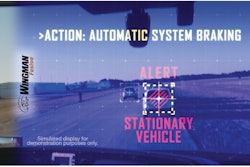 The NTSB said the truck driver involved in a six-fatality crash last summer did not respond to slow traffic caused by a work zone.
The NTSB said the truck driver involved in a six-fatality crash last summer did not respond to slow traffic caused by a work zone.The National Transportation Safety Board said this week the U.S. DOT needs to tighten drug screening requirements for truck operators. Its recommendations come following its investigation into a June 25, 2015, crash in Chattanooga, Tenn., involving a tractor-trailer. Six people were killed in the crash, and four others injured.
NTSB’s recommendations carry no legal bearing and are only recommendations for regulators.
NTSB found in its investigation that Kentucky-based driver Benjamin Scott Brewer did not slow down when traffic was backing up in front of him in a construction zone, and that he had illegally used methamphetamine before the crash occurred. NTSB said the toxicology report indicated a pattern of drug use, and if the carrier, Cool Runnings Express, had used pre-employment hair drug tests, Brewer’s methamphetamine use could have been detected.
The agency said Brewer’s operation of the truck “through the work zone at 78-82 mph significantly hindered his ability to react in time to take evasive action to avoid vehicles,” which led to a more severe crash, and added that he had not taken rest breaks as required by hours-of-service regulations.
Following the crash, the Federal Motor Carrier Safety Administration issued a shutdown order to Brewer. FMCSA said then that Brewer had falsified his logs to show he had been off-duty from June 15 until 7 a.m. June 25. However, FMCSA’s investigation found that Brewer had been on-duty and driving June 22, 23 and 24.

NTSB made four new recommendations to the Federal Motor Carrier Safety Administration following the crash:
- Provide information to carriers about using hair testing to detect the use of controlled substances as an option instead of urine testing. (NTSB has recommended in the past that FMCSA allow carriers to use hair testing in lieu of urine tests to satisfy drug screening requirements, but the board has never recommended FMCSA require hair testing.)
- Modify the regulations for hiring drivers to require carriers to conduct the same review on potential hires as they conduct on employed drivers annually.
- Evaluate how many carriers use FMCSA’s Pre-Employment Screening Program and what their perspectives on the program are, then address any barriers affecting its use. NTSB recommends FMCSA examine the value, accuracy and timing of the information provided to carriers through the program, as well as the cost and incentives for using the program.
- Publish best practices for pre-employment investigations for carriers.
NTSB also reiterated a recommendation it has previously made to FMCSA, which was for the agency to determine the prevalence of truck drivers’ use of drugs and develop a plan to reduce the use of them.
Additionally, NTSB recommended for the Kentucky Transportation Cabinet and the Idaho Transportation Department to include driver status, license expiration, driving restrictions, violations and crashes in the three-year driver motor vehicle record.
“Implementation of our recommendations made today can lead to a prospective employer having access to a driver’s full driving history, including involvement in previous crashes, incidents of speeding, or operating while impaired by alcohol or other drugs. Access to this history will help make pre-employment screening more effective, help keep high-risk drivers off the roads, and thereby possibly prevent this type of accident from happening again,” said NTSB Chairman Christopher A. Hart.











